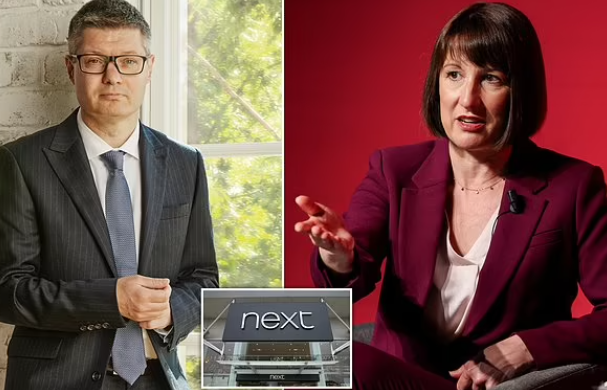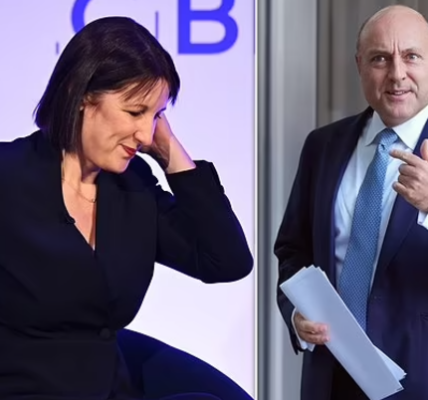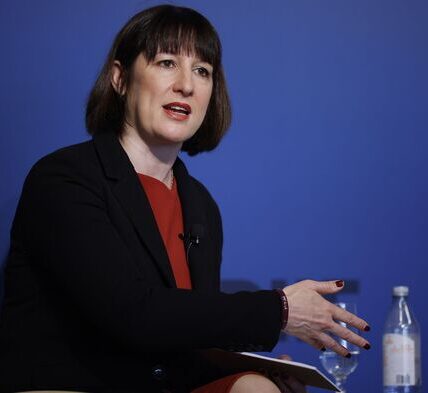Major high street chain warns it will hike prices after Labour’s tax raid budget as it is facing £67m rise in wage costs this year following changes to national insurance contributions_Nhy
Next today warned that it will hike prices to cope with a £67million rise in wage costs after Labour’s tax raid Budget.
The High Street giant warned it would face the additional bill in the year to January 2026 after Rachel Reeves announced plans to increase employer national insurance contributions and the minimum wage from April.
It said it will need to push through an ‘unwelcome’ 1% rise in prices as part of efforts to help offset the hit.
And in a concerning forecast from one of the great success stories of British retail, Next warned of a hit not only to its sales but UK growth as a whole.
Sir Keir Starmer has made economic growth one of the key priorities of his government.
Next reported a better than expected 5.7 per cent rise in underlying full-price sales for its fourth quarter so far, and upped its full-year pre-tax profit outlook once again, pencilling in a 10 per cent jump to £1.010 billion.
This compares with previous guidance for a 9.5 per cent rise to £1.005billion.
But over the new financial year to January 2026, it expects sales growth to slow to 3.5 per cent and for group profits to increase by a more muted 3.6 per cent to £1.05 billion.

Next, which is headed by Lord Wolfson, warned that it will hike prices to cope with a £67million rise in wage costs after Labour’s tax raid Budget

Next warned of a hit not only to its sales but UK growth as a whole.
Next said: ‘We believe that UK growth is likely to slow, as employer tax increases, and their potential impact on prices and employment, begin to filter through into the economy.’
It also warned that overseas sales growth – which had surged to 24% in 2024-25 – will fall back as it reins in marketing spend after investing heavily in this over the past year.
‘We do not believe we can profitably increase our overseas marketing expenditure by the same percentage next year, and expect the growth to be closer to 20%,’ it said.
The firm said an expected 1 per cent increase in prices will offset around £13million of its higher wage bill.
It will look to make overall savings of £23million in the face of the cost increase, with measures also including ‘improved working practices and other operational efficiencies in our warehouses, distribution networks and stores’.
The Next trading update comes amid wider gloom on the High Street as sales over Christmas fell short of expectations.
Retail sales were up 3.2 per cent annually in the four weeks to December 28, aided by the inclusion of Black Friday in late November, according to the closely-watched British Retail Consortium (BRC)-KPMG Retail Sales Monitor.
December helped fourth-quarter sales growth overall to just 0.4 per cent, reflecting a fall in sales volumes when higher prices are taken into account.

Next said: ‘We believe that UK growth is likely to slow, as employer tax increases, and their potential impact on prices and employment, begin to filter through into the economy’
The BRC said food sales inched 1.7 per cent for the month, reflecting a sharp slowdown from a December 2023 growth rate of 6.3 per cent and below their 12-month average of 3.3 per cent.
Non-food sales jumped 4.4 per cent for the month, with AI tech and beauty advent calendars in high demand, but this failed to make up for a weak 2024 overall.
Data shows non-food sales have fallen 1.1 per cent on average over the last 12 months and were down 1.5 per cent on 2023 levels.
BRC chief executive Helen Dickinson said the crucial golden quarter ‘failed to give 2024 the send-off retailers were hoping’, and warned of further disappointment ahead this year.
She added: ‘While we project sales growth to average 1.2 per cent in 2025, this is below the projected shop price inflation of 1.8 per cent.’
‘This means volumes are likely to fall this year.’
British retailers have warned of jobs cuts, hiring freezes and price hikes in 2025 in response to measures outlined in Autumn Budget, which the BRC says will increase costs by £7billion annually.
Research analyst at Shore Capital Clive Black blamed Labour’s policies for both a disappointing fourth quarter and for the looming spectre of higher prices.

Sales volumes fall as shoppers restrict Christmas spending
He said: ‘Peak season shopping is directly impacted by the UK Government’s narrative and policies, which show ideology, stupidity and naivety, compounding the total mess that the Tories left.
‘What is particularly difficult here for the Government is that it does not seem to understand the inflationary nature of its policies, especially the combination of the National Insurance and National Living Wage policies, but also things like the forthcoming Employment Bill and EPR, which will make it much more potentially difficult for the Bank of England to ease base rates at a time when the UK is calling out for a monetary boost.
‘All in all, the weak December retail trade, again, notably for non-food, is an unwelcome sector and macroeconomic development for the UK.’


